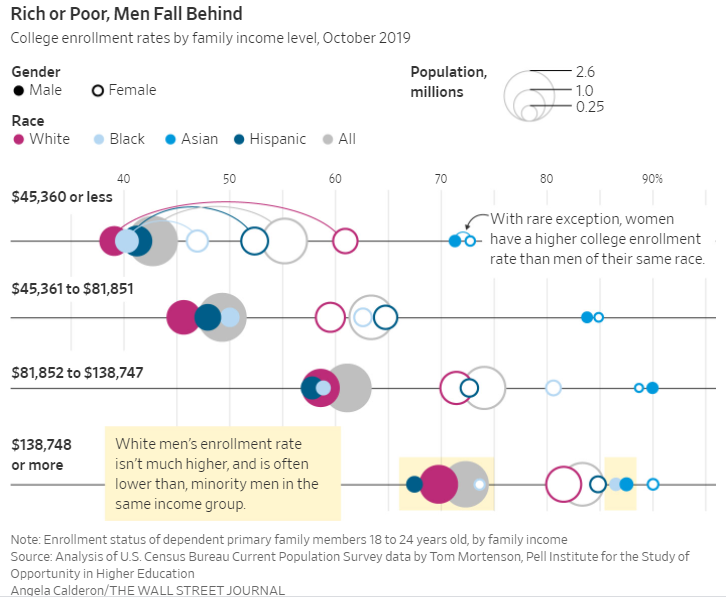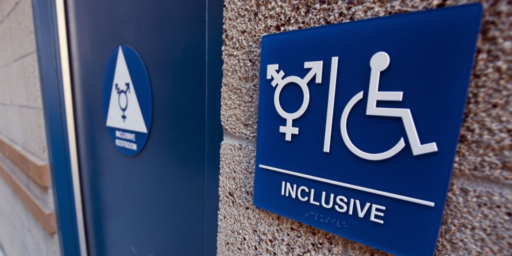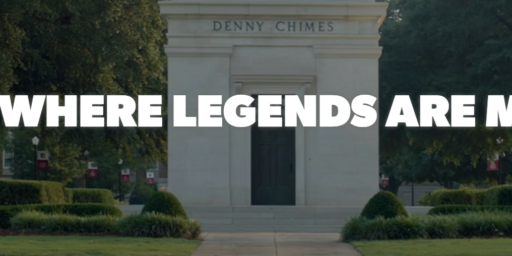The Collegiate Gender Gap
Women are increasingly dominating American higher education.

from PxHere
In “A Generation of American Men Give Up on College: ‘I Just Feel Lost‘,” the Wall Street Journal reports on a growing trend.
Men are abandoning higher education in such numbers that they now trail female college students by record levels.
At the close of the 2020-21 academic year, women made up 59.5% of college students, an all-time high, and men 40.5%, according to enrollment data from the National Student Clearinghouse, a nonprofit research group. U.S. colleges and universities had 1.5 million fewer students compared with five years ago, and men accounted for 71% of the decline.
This education gap, which holds at both two- and four-year colleges, has been slowly widening for 40 years. The divergence increases at graduation: After six years of college, 65% of women in the U.S. who started a four-year university in 2012 received diplomas by 2018 compared with 59% of men during the same period, according to the U.S. Department of Education.
In the next few years, two women will earn a college degree for every man, if the trend continues, said Douglas Shapiro, executive director of the research center at the National Student Clearinghouse.
No reversal is in sight. Women increased their lead over men in college applications for the 2021-22 school year—3,805,978 to 2,815,810—by nearly a percentage point compared with the previous academic year, according to Common Application, a nonprofit that transmits applications to more than 900 schools. Women make up 49% of the college-age population in the U.S., according to the Census Bureau.
This phenomenon has manifested over the course of two-plus decades now and the gap is widening. Initially, most attributed it to different social pressures (in some American subcultures, doing well in school is frowned upon for boys) and economics (there are a plethora of high-paying jobs in construction and other male-dominated fields that compete with college). But something more is clearly going on.
American colleges, which are embroiled in debates over racial and gender equality, and working on ways to reduce sexual assault and harassment of women on campus, have yet to reach a consensus on what might slow the retreat of men from higher education. Some schools are quietly trying programs to enroll more men, but there is scant campus support for spending resources to boost male attendance and retention.
The gender enrollment disparity among nonprofit colleges is widest at private four-year schools, where the proportion of women during the 2020-21 school year grew to an average of 61%, a record high, Clearinghouse data show. Some of the schools extend offers to a higher percentage of male applicants, trying to get a closer balance of men and women.
“Is there a thumb on the scale for boys? Absolutely,” said Jennifer Delahunty, a college enrollment consultant who previously led the admissions offices at Kenyon College in Gambier, Ohio, and Lewis & Clark College in Portland, Ore. “The question is, is that right or wrong?”
Ms. Delahunty said this kind of tacit affirmative action for boys has become “higher education’s dirty little secret,” practiced but not publicly acknowledged by many private universities where the gender balance has gone off-kilter.
It’s bizarre, indeed, that after decades of trying to figure out how to attract more women to the STEM fields, the focus is shifting to attracting more men to higher education, period.
At Baylor University, where the undergraduate student body is 60% female, the admission rate for men last year was 7 percentage points higher than for women. Every student has to meet Baylor’s admission standards to earn admission, said Jessica King Gereghty, the school’s assistant vice president of enrollment strategy and innovation. Classes, however, are shaped to balance several variables, including gender, she said.
Ms. Gereghty said she found that girls more closely attended to their college applications than boys, for instance making sure transcripts are delivered. Baylor created a “males and moms communication campaign” a few years ago to keep high-school boys on track, she said.
Among the messages to mothers in the campaign, Ms. Gereghty said: ” ‘At the dinner table tonight, mom, we need you to talk about getting your high school transcripts in.’ “
So, it’s not shocking that 17- and 18-year-old girls are more likely to have their act together on administrative management than their male counterparts. But, again, that’s not a new phenomenon nor, absent considerable evidence to the contrary, salable as a growing one. So it simply doesn’t explain the current trendline.
The college gender gap cuts across race, geography and economic background. For the most part, white men—once the predominant group on American campuses—no longer hold a statistical edge in enrollment rates, said Mr. Mortenson, of the Pell Institute. Enrollment rates for poor and working-class white men are lower than those of young Black, Latino and Asian men from the same economic backgrounds, according to an analysis of census data by the Pell Institute for the Journal.
This befuddles me, although I think it’s largely a function of the bizarre conflation of nonprofit and for-profit institutions into the same category. That’s not obvious from the associated graphic:

But several times in the story they’re talked about as if they’re one and the same.
As to the So what?
No college wants to tackle the issue under the glare of gender politics, said Ms. Delahunty, the enrollment consultant. The conventional view on campuses, she said, is that “men make more money, men hold higher positions, why should we give them a little shove from high school to college?”
Yet the stakes are too high to ignore, she said. “If you care about our society, one, and, two, if you care about women, you have to care about the boys, too. If you have equally educated numbers of men and women that just makes a better society, and it makes it better for women.”
[…]
Over the course of their working lives, American college graduates earn more than a million dollars beyond those with only a high-school diploma, and a university diploma is required for many jobs as well as most professions, technical work and positions of influence.
Yet skyrocketing education costs have made college more risky today than for past generations, potentially saddling graduates in lower-paying careers—as well as those who drop out—with student loans they can’t repay.
Social science researchers cite distractions and obstacles to education that weigh more on boys and young men, including videogames, pornography, increased fatherlessness and cases of overdiagnosis of boyhood restlessness and related medications.
Men in interviews around the U.S. said they quit school or didn’t enroll because they didn’t see enough value in a college degree for all the effort and expense required to earn one. Many said they wanted to make money after high school.
The declining economic utility of college has been a longstanding topic of discussion here. The cost of attendance has skyrocketed compared to inflation and, while the job market increasingly requires a bachelorette degree for entry the wages aren’t keeping pace. But, unless the insinuation is that men are figuring this out way faster than women—a dubious assumption—it doesn’t explain the divergence.
And this sort of thing doesn’t help much:
Men dominate top positions in industry, finance, politics and entertainment. They also hold a majority of tenured faculty positions and run most U.S. college campuses. Yet female college students are running laps around their male counterparts.
The University of Vermont is typical. The school president is a man and so are nearly two-thirds of the campus trustees. Women made up about 80% of honors graduates last year in the colleges of arts and sciences.
These are apples and oranges comparisons. The male dominance of the leadership sector, most of whom graduated college thirty or more years ago and before this trend began, really has nothing to do with current graduation and matriculation rates.
The young men who enroll lag behind. Among University of Vermont undergraduates, about 55% of male students graduate in four years compared with 70% of women. “I see a lot of guys that are here for four years to drink beer, smoke weed, hang out and get a degree,” said Luke Weiss, a civil engineering student and fraternity president of Pi Kappa Alpha at the campus.
Female students in the U.S. benefit from a support system established decades ago, spanning a period when women struggled to gain a foothold on college campuses. There are more than 500 women’s centers at schools nationwide. Most centers host clubs and organizations that work to help female students succeed.
Young women appear eager to take leadership roles, making up 59% of student body presidents in the 2019-20 academic year and 74% of student body vice presidents, according to W.H. “Butch” Oxendine, Jr., executive director of the American Student Government Association.
“Across all types of institutions, particularly two-year institutions, but also extending into public and private four-year institutions, women dominate student government executive boards,” Mr. Oxendine said.
So, again, this seems to be grasping at straws. Are today’s men really that much more likely to be distracted by drugs and pornography than their generational forebears? Is the creation of clubs designed to help women succeed really having such an outsized impact that the men don’t have a chance? Color me skeptical.
Young men get little help, in part, because schools are focused on encouraging historically underrepresented students. Jerlando Jackson, department chair, Education Leadership and Policy Analysis, at the University of Wisconsin’s School of Education, said few campuses have been willing to spend limited funds on male underachievement that would also benefit white men, risking criticism for assisting those who have historically held the biggest educational advantages.
“As a country, we don’t have the tools yet to help white men who find themselves needing help,” Dr. Jackson said. “To be in a time when there are groups of white men that are falling through the cracks, it’s hard.”
Keith E. Smith, a mental-health counselor and men’s outreach coordinator at the University of Vermont, said that when he started working at the school in 2006 he found that men were much more likely to face consequences for the trouble they caused under the influence of drugs and alcohol.
In 2008, Mr. Smith proposed a men’s center to help male students succeed. The proposal drew criticism from women who asked, “Why would you give more resources to the most privileged group on campus,” he said.
Again, absent more than anecdotes and a couple of cherry-picked quotes that seem to serve an ideological agenda, I’m skeptical that this is the reason for the gap.






I would very much like to see the cross tabs for STEM/non-STEM vs male/female (or maybe male/non-male).
I know four young men in college or recently graduated. All of them were STEM focused. One of them is now fighting wildfires across the West, and he is the one with the “softest” stem degree. He went to Cal State Humboldt, and majored in surfing, but managed to pick up a degree in Forestry. (I think of that as STEM, but opinions may vary.) Two are doing engineering jobs, and the fourth is still working on his physics degree.
I think that now a liberal arts degree is read as female, and that the jobs it might lead to are also read as female. But that’s probably not how they are experiencing it. They are probably thinking “being an assistant contracts manager is boring, fighting fires is exciting and cool, and pays more [probably]”
There are many jobs which require college degrees that are traditionally associated with women’s work. Men don’t want to do these jobs, and the enormous number of colleges devoted to filling these jobs are pushing these men away.
HR for example–it’s 71% women. It’s basically women’s work. Like teaching or being a nurse. You are supporting more productive others, and are often demeaned for your irrelevance. So men don’t work in HR and women do.
@Jay L Gischer:
I did physics, and I would Definitely call Forestry STEM. Partly because when I was in undergrad, in a class called BioGeoChemistry, two guys in Forestry were in the class, and they were the only country boys I’d ever seen who had no doubts about Global Warming, because they saw firsthand the effects on trees and growth zones shifting northward, and being in that class meant they must’ve had the necessary Chemistry to understand CO2, infrared absorption spectra, etc. That’s Science.
I’ve seen a lot of memes comparing a college degree and its associated debt with a high-paying career in the trades, with the point being to encourage more students to pursue the trades instead of a degree.
A recent discussion of this meme made me rethink it. The person addressing it pointed out the following:
1) Many trades are seasonal. Sure they’re high-paying–in season. The rest of the year, you’re screwed.
2) Many trades have an earning ceiling. Unless you have the drive and ability to turn your trade into your own business, your salary will not exceed that ceiling.
3) Many trades take a big toll on one’s physical body. This means that at some point–often in one’s fifties–continuing to pursue your trade becomes more and more difficult.
@Modulo Myself: Maybe people need to rethink this? I think of a profession like nursing, where the need for male nurses, especially ones who are physically strong (think–lifting patients) is critical. Or teaching, where inspiring all students, but especially male students, is an important task of male teachers. Just because society currently codes something as female doesn’t mean we have to accept it that way.
Is this really that much different than what happened in the past? I don’t think it’s that guys are dropping out from going to college; I think it’s that more women are deciding to go because they realise education is an opportunity to jump up the salary ladder and because getting married right after high school isn’t a realistic/expected life-path any more.
I wonder how many of the guys we’re hearing “aren’t going to college” will decide at some time in the future that further education is something that they will do. After all, if you don’t have the foggiest idea what you want to do in life and look upon college as nothing more than an opportunity for beer-drinking and babes, taking several years hiatus might be the more intelligent decision.
@grumpy realist: FYI, my 28-year-old nephew recently got his registered nursing degree, and is now working in an ICU and loving it. At 22, he was unlikely to have had the maturity to pursue a career like this.
Matriculants for medical school in 2020 were 53.6% Women and 46.2% Men. It doesn’t add up to 100%, so I’m guessing that 0.2% are undecided.
Here’s the data for all US allopathic (MD) schools.
https://www.aamc.org/media/5976/download
The highest women enrollment is Michigan with 64.9%, while the lowest is University of Nevada, Las Vegas at 40% women. I didn’t even know Nevada had a med school. Apparently, its first class started in 2017.
My alma mater, University of Washington, is now 60% women and has been for years. My class, about 30 years ago, was 50% women.
@Monala:
Nursing is a great career for men. One of my ski buddies quit his job as an engineer years ago at the behest of his girlfriend, who was an RN. He didn’t like his job and she was making more money than he was with better hours and benefits. He now manages a burn/ICU and loves it.
Men make up only 9.4% of nurses in the US. (page S12). However, they do earn more money. (page S41)
https://www.journalofnursingregulation.com/article/S2155-8256(21)00027-2/pdf
@Monala: Even if you turn your trade into your own business, you still have to charge about twice what you make for the sake of reserves, taxes that your employer used to pay that are on you now, the fact that not all of your work time will be “billable” and other factors–and that’s to make what you do now. And there’s the old joke about choosing your own hours–as long as they total 24 per day.
Well, you have to look at the follow on after the university. Corporate cubicles are not friendly to men either. Scott Adams tells the story of two corporate positions where he was bluntly told he would not be promoted because he was a white male and the orders had come down to promote other demographics. Partly why he ventured into what made him is fortune. So student loan debt and dim prospects are disincentives.
And higher ed has been slow to adapt to what is needed today and in the future:
–Econtalk podcast with economist Ed Leamer, April 13, 2020
@Monala:
I don’t know if this is the shared experience, but I found young women of my age more adult and more capable than I was in my early 20s.
I was fumbling and a bit lost, whereas they much more likely to be focused.
I had ideas and vague goals and they had concrete plans.
@JKB: I am deeply skeptical of stories that go like “we can’t promote you because of a mandate from on high to promote minorities”. That’s potentially classic scapegoating. It’s ducking the very hard thing of saying, “You don’t measure up” for something much easier – blame someone who isn’t part of the conversation.
Let’s face it, if management thought someone was a big talent, they would figure out a way to promote them.
Do I know for a fact this is what happened? No, I don’t. I just have all these warning signs that go on when management says “We have to do X” regardless of what “X” is. That’s a blame-shifting move.
@Jay L Gischer:
On the upside, Scott Adams found other opportunities that were more lucrative than a career in a bank.
But throughout my career, there were opportunities where the requirements to be accepted as a male were far higher than a female because the old sexists in charge had to make up their numbers after past discrimination. It is life, and actually understandable. But on the other hand, I as a male looked for other opportunities. Perhaps these young men are doing similar calculations in that college no longer has a high pay off for white males. No use wasting 4 years of your life and taking on debt if the future pay off isn’t there, regardless of the hype using people who went to college in the ’60s and ’70s
@JKB: There’s also the fact that a lot of pedagogics at the college level haven’t changed since the Middle Ages. In fact, considering our dumping of the whole Art of Memory skills in the 17th century, we’d probably do better going back to the 1300s!
@JKB: P.S. one of my friends and I joke about AI bots at some point automating my job away, to which I always shake my head and say “I wish!” Until all documentation of technology is written using the exact same vocabulary for all publications, I’m afraid patent examinations are going to be done by humans.
@JKB: Interestingly enough, prospects were far different for a person who graduated from college in the 60’s than they were for someone who graduated in the late 70’s, like I did. At that later date, you are on the downslope of the baby boom and all the panic about filling the slots to meet the needs of the boomers has faded. (The generation born in the 1930’s had an even more rosy job market, regardless of their education, by the way. Sometimes when you were born makes a big difference.)
I personally think that college is an experience that’s worth quite a bit in and of itself. And yet, the price these days is way, way higher than it was in my day, and I’m not especially happy about that.
@JKB: I’m just going to note that these days, any anecdote that starts with “Scott Adams tells the story” automatically triggers my skepticism. I’ll move on now.
Am I wrong in assuming that socio-political ideology issues are at least *a* factor in this trend?
@JKB: I changed my mind. (I really shouldn’t read these posts to the end. 🙁 ) I have two more observations to make.
First, kudos to JKB for finding a source from the 21st Century to cherry pick from.
Second, I feel really badly that Ed Leamer got such a crummy experience during his college education compared to the one I got less than a decade later. I googled him to see what his career is and hope that he did better by his students than his teachers did by him. (But seeing his podcast topic, I suspect that he didn’t. 🙁 )
Lots of anecdote and speculation in the article, which means this effect is likely multi-factoral. It was kind of disappointing the article didn’t explore this more.
It is also interesting to note that college attendance rates for men and women have gone up considerably over time, but they’ve gone up much more for women. We are probably nearing the peak of what we can expect in terms of percent of the population that can get through a bachelor’s program – at least without making degree requirements easier, which is probably gonna happen.
Some thoughts.
We had nearly the opposite ratio in 1970. I dont remember it being called a crisis.
Kind of hard not to blame the guys in college to be concentrating on babes and beer with the boy girl ratio so favorable.
What are the acceptance ratios and how qualified are boys vs girls?
Steve
@JKB:
I call bullshit on Scott Adams. That’s not how anything works — no one is told that. And no one is told that twice.
He probably just sucked at his job, or wasn’t going to do well at the next level. And when a woman got the job, decided the rest was obvious.
I’m not saying there is no discrimination against white men — there is, but less than the favoritism shown them over the long haul — but people are subtler about it when it really happens.
Even in the old days. “They went with some broad” is code for “you’re such an asshole that they decided to hire some broad rather than deal with you.”
@Gustopher: I concur. As a Mom, I have learned to excel at telling my kids they can’t do or have something “Because the powers on high have decided no for such and such a reason”, but I have make it sound totally logical, use big words they don’t quite comprehend yet but they’ve heard before (like “affirmative action” and “demographics”, in a work sense), and that’s the end of it.
Tricky little shits use it to get out of social engagements they don’t want to go to, now. “Sorry, my Mom said no”, when I said no such thing, they didn’t even ask me! 😛
I suspect one of the reasons is because non-college jobs for men are better payed than non-college jobs for women; yes, this was already true some decades ago, but I suspect that one of the reasons why women went less to college before is because many parents were afraid that their “little girl” could end up pregnant and a single mother if she went alone to the big city, then many women only went to colleges near home (and a combination of the pill and different social mores changed that)
@Miguel Madeira: There’s also the “she’s just going to stay home after she’s married and be a housewife; why does she need a college education?”
(I forget which eminent Victorian made the comment that women only needed to be literate enough to put their husbands’ books back on the shelves in the correct order after dusting!)
Interesting. I stayed off this thread because I’d already written a long comment on the decline of men on the open thread. My take-away is that many if not most of the comments above would have been very different if the OP had switched the genders. Or if those same stats applied to Black, brown, Asian, or any other group.
Trouble comes where you don’t expect it. We are all so primed to frame things in a majority oppressor, minority victim formulation that we may miss the larger problem, the larger threat. I’m not talking social justice, I’m talking social danger. Here’s the thing. Unhappy women have never overthrown a government. Unhappy minorities – 13% Black, 15% brown, or whatever, do not endanger society at large. Unhappy men are in a completely different category. Unhappy men beat down the doors of the Capitol and threaten to start lynching Congresspeople. Unhappy men shoot up schools and workplaces. Unhappy men form groups with other heavily-armed unhappy men to kill.
Men and women are equal in just about everything, but not in violence or the threat they pose.
An excerpt from my upcoming Quillette piece:
“Perhaps it has come time for us to bravely confront a truth, however politically incorrect it may be, that women are in fact the superior intellects, and more deserving of wealth and power than men.”
Three hundred and fifty or so years ago, there were those who escaped the control of the universities of the time. They, freed from the technophobia, transformed human existence. Who knows what might happen now.
Perhaps waning now, Nassim Taleb observed that “Education stabilizes the income of families across generations.” The merchant makes money, sends his kids to college to become doctors, lawyers, thus a middle class income even as the family wealth depletes over generations. But that trend is not assured these days except maybe at the few elite credential granters.
It’s taken 50 or so years for universities to decline to their current state. That’s the length of faculty careers mostly. Perhaps change will prompted by the decline in enrollment and loss of a influence over a demographic. Check back in 2060 or so.
@JKB:
Your own education evidently left you incapable of dealing with reality, Q-Boy. You live inside a racist, paranoid fantasy of such surpassing stupidity that if there were a Nobel prize for sheer malignant imbecility, it would go to Trumpies like you, and the prize would have to then be retired.
@JKB:
Nope. Sorry, not true. It’s a myth. But thank you for playing.
@JKB: What in the HELL are you talking about?! I have a better argument that the Royal Society was started by Christian Cabalist refugees from the Winter King’s court!